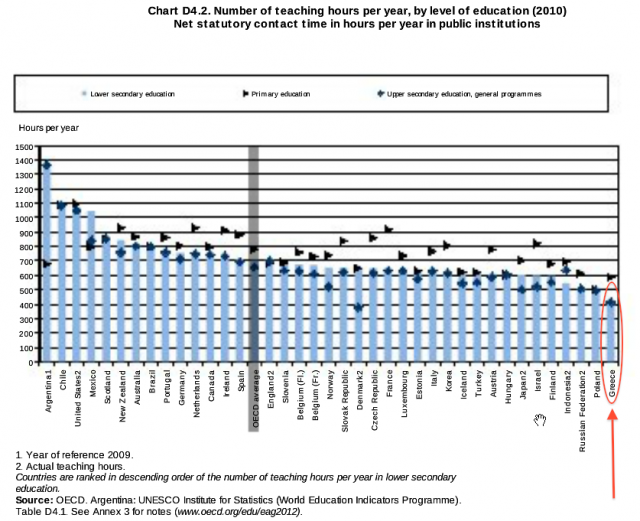Photo: imerisia.gr
Victoria Mindova
A two-hour increase in school hours per week and mandatory reassignments of teachers in secondary schools have instigated another social “bomb” in Greece.
The data of the Organisation for Economic Cooperation and Development (OECD) show that the teachers in Greece rank last among the developed countries as regards the number of teaching hours.A week ago, the government announced that in order for the working hours of Greek teachers to be equal with the average rate adopted in the European Union, they would be increased from 21 to 23 hours per week. In addition, it announced a programme of transferring teachers to different schools in order for them not to be fired after the closure of some educational centres and the filling of empty positions in others.
The Greek Federation of Secondary Education State School Teachers (OLME) had immediately responded to the changes proposed by the government. The trade unionists stated that they would take active strike actions during the matriculations if the government did not withdraw its proposal. Both sides had sat at the table of negotiations at the end of last week, but did not reach consensus.
Having a clear notion of the course of the situation, the government announced on Sunday that it would mobilize all 88,000 secondary school teachers in the public education system in order to prevent the failure of this year's matriculations. On Monday afternoon, the police began handing out by regions the summonses of civil mobilization to the teachers who had not yet taken a final decision on whether the strike would take place or not.
The preventive measure of the government had exacerbated the sensitivity of the trade unionists who saw in the mobilization during matriculations the return of the military junta in Greece. On Monday evening, the teachers held a quick protest against the upcoming mobilization. They were dressed in green uniforms and chanted in front of the parliament slogans against the government. It is all because of the two additional working hours a week.
The social media exploded with a series of comments on the latest civil mobilization (the measure has been applied several times over the past three years - to port workers during the summer season, to owners of trucks in 2010 and to public transport workers in Athens in 2012).
A Twitter user resorted to satire to ridicule the government's decision to force the teachers not to strike  during the matriculations: "We have no medicines. There is nothing we can do, because the companies do not sell to us as we owe them money./ There will be no exams, teachers are on strike – MOBILIZATION!"
during the matriculations: "We have no medicines. There is nothing we can do, because the companies do not sell to us as we owe them money./ There will be no exams, teachers are on strike – MOBILIZATION!"
However, the teachers are not supported by all. The majority of citizens disagree that the pupils should become victims of the power struggles between the government and the school unions. The results of the poll carried out by the marketing research and communication company MARC and commissioned by Alpha TV show the same. According to it, 72% of respondents believe that the reaction of teachers is exaggerated and they do not agree with the strike on the day of matriculations. Another 22% justify the actions of the teachers and think that they are entitled to exercise their right to civil protest regardless of how important the period is for the secondary school graduates.
Once the subpoenas began arriving at the houses of the teachers, the board of the teachers’ union sought assistance from the union of public sectors workers (ADEDY). They demanded the largest trade union that protects the public officials in the country to declare a 48-hour strike on Thursday and Friday this week, thus trying to circumvent the mandatory going to work due to the civil mobilization.
Much to the surprise of the public, ADEDY has discretely refused to cooperate, stating that it fully supports the demands of the teachers but it disagrees with the disrupting of the programme of the pupils who have been preparing themselves for the serious exams all year round.
On Tuesday, after long hours of sitting, the regional union boards of teachers in the region of Attica decided with an almost absolute majority that they would hold a strike on the first day of matriculations - Friday, 16 May 2013. In the central area of Athens, 188 union members out of 200 voted "for" active strike actions. In the area of west Athens, 425 union members from a total of 478 supported the strike. The data reported from other areas are similar.
Regardless of the outcome of another socio-political conflict, the data on the state of Greece's public education system remain persuasive. Journalist Pasichos Mandravelis published in his Twitter profile a table of the number of teaching hours per year per teacher in different countries. The data of the Organisation for Economic Cooperation and Development (OECD) show that the teachers in Greece rank last among the developed countries as regards the number of teaching hours.

Mandravelis notes that even if the two additional hours per week are approved by the teachers, the ranking of Greece will not change. The country will register 477 teaching hours per year when the average value adopted in the member countries of the Organization for Economic Cooperation and Development (OECD) is 704 hours per year. The journalist notes that Greek teachers have the privilege of working only 31 weeks a year when the average value for OECD countries is 38 - 40 weeks in Australia and 42 in Denmark.